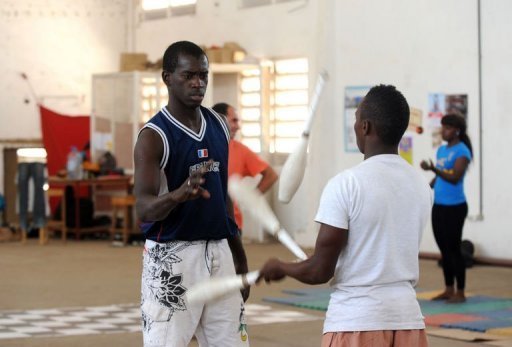
“Most of the children come from the street… and many are foreigners from Guinea-Bissau, Mali, Guinea and Gambia,” said Anta Mbow, who founded the centre.
“They are victims of abuse and victims of trafficking. The people who exploit them… take them from a village in another country and bring them to Dakar, put them together and make them beg all day.”
Modou Fata Touray, now 23, stumbled across the centre aged 14 when he was living on the streets after escaping from a Koranic school in neighbouring Gambia.
“When I found Empire, I was so tired,” he said.
“You do not eat. I saw children going to school and I wanted to be like them. I had to find a solution to be like them.”
The west African talibe-marabout relationship has not always been so controversial.
Top Senegalese politicians, including former leader Abdoulaye Wade who styled himself “the first president-talibe”, studied the Koran with a marabout and rely today on the advice of these holy men who still hold tremendous sway.
Indeed for centuries, rural Senegalese families selected a male child to send to study the Koran with a marabout, often in a neighbouring village away from the family to help them focus on their studies.
In many cases the children were required to ask neighbours for food once a week, an accepted way to teach the Islamic tenet of humility.
But as drought gripped Senegal in the early 1970s and farmers slipped into poverty, unable to feed their families, they began sending their boys to live and study in daaras in Dakar.
Unregulated and away from the scrutiny of close-knit rural communities, the lessons in humility quickly turned into the forced begging which is now so deeply rooted in Senegalese culture.
In 2005 then-president Wade passed a law banning people from making a profit from forced begging, with a maximum sentence of five years’ imprisonment, and in 2010, for the first time, seven marabouts were convicted.
His successor Macky Sall also pledged better enforcement of the law after the Dakar fire.
Nine years after coming to Dakar as a street child, Touray believes opportunity rather than the law will play the biggest part in turning around the lives of talibes, however.
During his time at Empire he attended acrobatics and juggling lessons which led him in 2010 to found SenCirk, the country’s only circus which now runs workshops for vulnerable groups and schools across Dakar.
He works as a trainer and performer for SenCirk, and recently took part in a prestigious run of performances in Dakar’s Grand Theatre, playing to almost 4,000 people over three nights.
“In the future, if I have the money I’m going to buy trampolines, juggling balls, acrobatic equipment and that sort of thing, and I’m going to put it all somewhere for children to play with,” he said.
“I like helping children. Their parents can pay and I’m going to teach them acrobatics, circus skills and everything like that. I’d like to create a space where children can play.”

